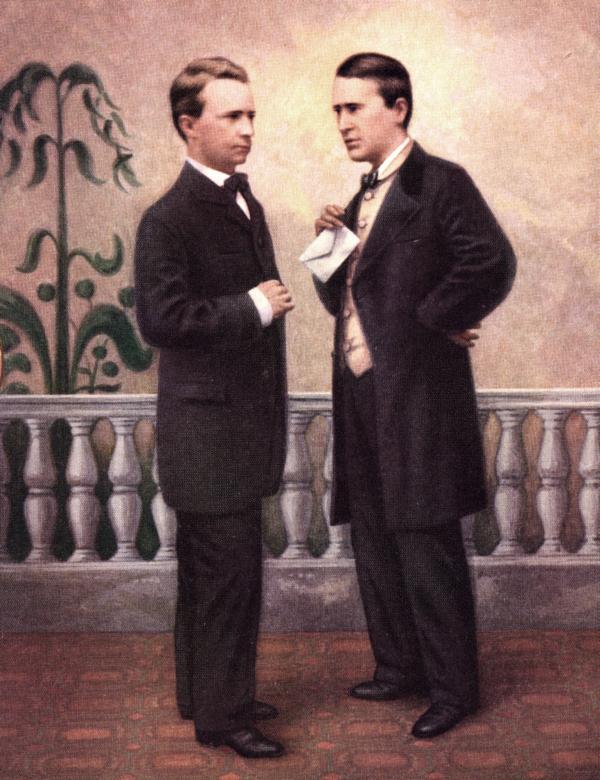

Partner Stephen Foster
 George
Cooper (May 14, 1840, New York City – September 28, 1927) was an American poet remembered
chiefly for his song lyrics, many set to music by
Stephen Foster.
Foster met law student and would be poet, Cooper, while in his decline into
poverty and alcoholism. The two met in the back room of a Bowery grocery store
at which Foster liked to do his drinking. The twenty year old Cooper came to
Foster with a poem he had written he thought would make good lyrics to a
Foster song. The composer read over the poem, then sat down at the piano and
created first a melody and then a composition. The song is one of the most
beloved of Fosters works, “Beautiful Dreamer”. After a life of writing mostly
his own lyrics to his melodies, Foster, one of the first professional
songwriters in history, proceeded to form a team with Cooper, who later had a
long career as a lyricist for many composers. Foster came called Cooper “the
left wing of the song factory”, and the two wrote 21 songs together over the
few remaining years of Foster’s life. His fortunes falling rapidly the
composer moved from boarding house to flop house, but on a January day in 1864
he had a little more money than usual and took a room in a hotel. While there
he fell from the bed and cut his neck and head on a broken washbowl. It was
Cooper who was called by the chambermaid who found him, got him to the
hospital, wrote to his brother about the accident, and then just a few days
later, informed him of Foster’s death. The two men’s nieces burned every last
one of their letters to each other.
George
Cooper (May 14, 1840, New York City – September 28, 1927) was an American poet remembered
chiefly for his song lyrics, many set to music by
Stephen Foster.
Foster met law student and would be poet, Cooper, while in his decline into
poverty and alcoholism. The two met in the back room of a Bowery grocery store
at which Foster liked to do his drinking. The twenty year old Cooper came to
Foster with a poem he had written he thought would make good lyrics to a
Foster song. The composer read over the poem, then sat down at the piano and
created first a melody and then a composition. The song is one of the most
beloved of Fosters works, “Beautiful Dreamer”. After a life of writing mostly
his own lyrics to his melodies, Foster, one of the first professional
songwriters in history, proceeded to form a team with Cooper, who later had a
long career as a lyricist for many composers. Foster came called Cooper “the
left wing of the song factory”, and the two wrote 21 songs together over the
few remaining years of Foster’s life. His fortunes falling rapidly the
composer moved from boarding house to flop house, but on a January day in 1864
he had a little more money than usual and took a room in a hotel. While there
he fell from the bed and cut his neck and head on a broken washbowl. It was
Cooper who was called by the chambermaid who found him, got him to the
hospital, wrote to his brother about the accident, and then just a few days
later, informed him of Foster’s death. The two men’s nieces burned every last
one of their letters to each other.
George Cooper, poet, was born in the city of New York, May 14, 1840 son of John and Hepzibah Cooper. He was educated in the public schools of his native city, and afterwards studied law under the late Chester A. Arthur. After practicing for a short time, he renounced his profession to devote himself to the vocation to which his natural gifts inclined him.
In his early years, he developed a taste for writing, and before his sixteenth year had begun to contribute acceptable verses to several leading magazines. Encouraged by the success that met his early productions, he wrote constantly, and became a regular contributor to such periodicals as “The Independent,” “Harpers’ Young People,” and “Harper’s Magazine,” “Atlantic Monthly,” “Putman’s Monthly,” “Our Young Folks,” and “Appleton’s Journal.” Writing constantly for more than a decade, Cooper frequently enriched the periodical literature of America by verses of much felicity, and attracted a wide circle, among his poems were always welcomed with pleasure. His happiest verse were written for children, and in it lies his chief claim to remembrance. A number of his children’s poems were published in the collection known as “School and Home Melodies;” and he also issued a volume of hymns consisting exclusively of his own writing and entitled, “The Chaplet.”
Among his best-known songs are: “Beautiful Isle of the Sea,” “Must We Then Meet as Strangers,” “Sweet Genevieve,” “While the days Are Going By,” and “God Bless the Little Church Around the Corner.” He wrote song words for such composers as Wallace, Abt, Thomas, Millard, and Foster. Of His Other poems, “After,” and “Hereafter” were general favorites; the “Ballad of the Storming of Stony Point” was awarded a prize, and “Learning to Walk” was honored by a commendation from the late William Cullen Bryant.
Cooper married, in 1877, to Mary E., Daughter of William Tyson, and since then resided at Jersey Heights.
My published books: